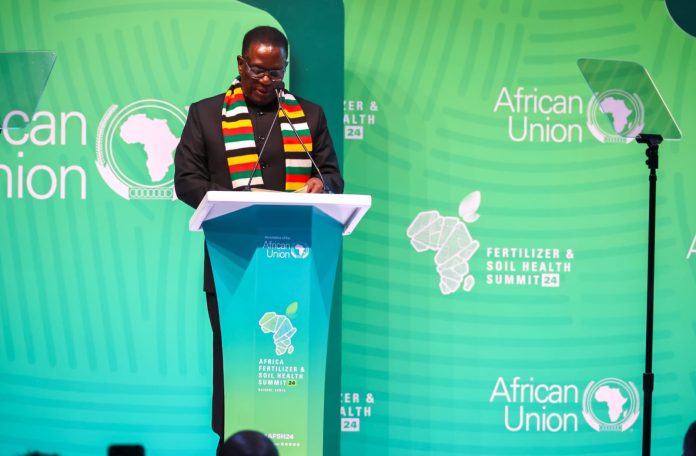President Emmerson Mnangagwa says it is regrettable that sustainable agriculture production and productivity on the African continent are being hampered by low fertiliser use and poor soil health.
The President, who was speaking at the Fertiliser and Soil Health Summit in Nairobi, Kenya this Thursday, urged African countries to use their resources to improve productivity in the agricultural sector.
President Mnangagwa joined fellow African leaders at the Africa Fertiliser and Soil Health Summit, with his keynote address raising concern that despite its potential, in agriculture production, the African continent is spending billions of dollars on food and fertilizer imports each year.
“It is unfortunate that despite the inherent potential, Africa currently spends billions of dollars in food and fertilizer imports per year. Greater efforts must be made to leverage the availability of raw materials for the local production of mineral fertilizers and reduce our overreliance on imports.
Similarly, agriculture extension communication and education programs should be strengthened with regards to scaling up fertilizer consumption to reach the target of 50kg per hectare,” said President Mnangagwa.
President Mnangagwa used the platform to highlight the strides Zimbabwe has made in boosting production through implementing soil health.
“Zimbabwe has not been spared from the adverse effects of climate change with our sub-region currently experiencing an El Niño-induced drought. However, my government continues to implement the agricultural food systems and rural transformation strategy, which among other aspects prioritises improved policies, investment, finance and markets for fertilizer and soil health management. Additionally, access to and affordability of organic fertilizers for sustainable soil management practices and interventions are being broadened.”
With the African Centre for Fertiliser Development based in Zimbabwe, President Mnangagwa said the centre remains a vital cog in promoting research on soil health and fertiliser development.
The chairperson of the African Union Commission, Mr Moussa Faki Mahamat who also addressed delegates noted the need to capacitate the Harare-based African Centre for Fertiliser Development to ensure it is fully operational and solve the region’s fertiliser challenges.
“Some African countries produce fertilizers, but we mostly depend on imports and this makes it expensive. Our production is low despite Zimbabwe hosting the fertilizer centre.”
The President of Kenya, Dr William Ruto highlighted the importance of addressing the issue of soil health and manufacturing fertilisers on the continent given that Africa has over 50 percent of the world’s arable land.
“Because Africa has 60 percent of the world’s agriculture health. That is a huge opportunity and it gives us to engage in Afro-processing, with agro-based raw materials. It is important to use the assets we have. It is important to address the issue of fertiliser availability.”
The inaugural Africa Fertiliser and Soil Health Summit was held in Abuja in 2006 and 18 years later, the challenges being experienced in food production have spurred the leaders to reconvene.
In the face of climate change, which has affected the country, the leaders continue to amplify their voices on the need to find mitigatory measures.
President Mnangagwa’s government has put in place several initiatives to work around the effects of climate change. These include the building of more dams and increasing hectarage under irrigation.
Image/ text- zbc













